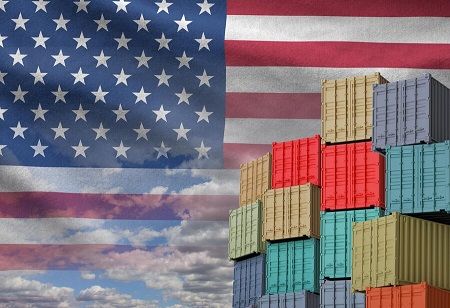
- Trump announces 100% tariff on imported chips, exempting U.S. makers.
- Apple to invest $100B in U.S. manufacturing over next 4 years.
- TSMC, Samsung, and Nvidia likely exempt; others may face fallout.
Donald Trump stated he would implement a 100% tariff on imported computer chips, probably increasing the prices of electronics, vehicles, home appliances, and other products considered vital for the digital era. “We’ll be putting a tariff of approximately 100% on chips and semiconductors,” Trump said in the Oval Office while meeting with Apple CEO Tim Cook. “But if you’re building in the United States of America, there’s no charge.”
The Republican president stated that firms producing computer chips in the US would be exempt from the import tariff. Throughout the Covid-19 pandemic, a lack of computer chips raised automobile prices and added to a general rise in inflation. Trump and Cook met to talk about a deal for Apple to put $100bn into US manufacturing over the coming four years. This follows the iPhone manufacturer’s earlier commitment to invest $500 billion in the U.S. this year. Thanks to Apple's latest investment, the overall amount has reached $600 billion.
Apple is often cited as an instance of a tech firm that is headquartered in the US yet carries out a significant portion of its manufacturing overseas. Most of Apple's products are manufactured in China, for instance, approximately 90% of iPhones are assembled there. Cook has met with Trump multiple times since the president assumed office to talk about increasing manufacturing in the US.
Taiwan Semiconductor Manufacturing Company (TSMC), the world's biggest chip contract manufacturer, was informed during a parliamentary briefing in Taipei on Thursday that it was “exempt” from the tariff, an official stated. Yeo Han-koo, South Korea's chief trade representative, stated that Samsung Electronics and SK Hynix will also be exempt from the 100% tariff.
Nvidia, a major chip producer in the US, is expected to be exempt from the tariff since the company operates manufacturing plants in the US. Questions directed to Nvidia and chip manufacturer Intel received no immediate response. However, the strategy may negatively impact other Asian nations, as Dan Lachica, the president of the Philippine semiconductor sector, stated that with nearly 70% of the nation's exports comprised of semiconductors, the updated regulations would be “catastrophic.”
Also Read: Japan Poised to Draft Extra Budget to Offset US Tariff Impact: PM
The global demand for computer chips has been rising, with sales growing by 19.6% in the year ending in June, as reported by the World Semiconductor Trade Statistics organization. Trump's tariff warnings represent a notable departure from current strategies to restore computer chip manufacturing in the United States. He is opting for a strategy that prefers the proverbial stick rather than carrots to encourage increased output.
Basically, the president is wagering that increased chip prices would compel many firms to establish manufacturing plants within the country, even though there’s a chance that tariffs might reduce corporate earnings and raise prices for smartphones, televisions, and refrigerators. Trump's upcoming 100% tariff on imported computer chips is scheduled to be officially revealed next week and is anticipated to affect all nations and businesses.

